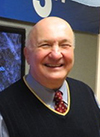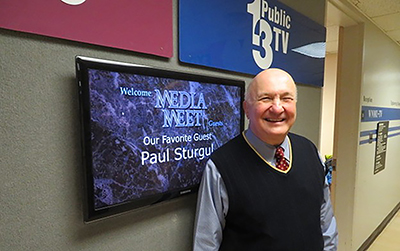I retired from the full-time practice of law on July 1, 2019. I first wrote about what I have been doing since then in the
December 2020 Elder Law and Special Needs Section Blog.
It is sometimes hard for me to believe that five years have passed since then. Here is a summary of some of my activities during this time.
I mentioned in my earlier article that I was still seeing a few clients, even though I had “officially” retired. I am still seeing clients, many of whom are longtime friends and neighbors. Some of them, including childhood friends, have delayed getting their estate planning done until now.
I see many of these clients out of a sense of professional obligation. There is a huge, growing dearth of lawyers in rural America.
 Paul Sturgul, U.W. 1973, is of counsel with
Sturgul & Long, S.C., in Hurley, and though retired since 2019, continues to practice elder law in Wisconsin and Michigan.
Paul Sturgul, U.W. 1973, is of counsel with
Sturgul & Long, S.C., in Hurley, and though retired since 2019, continues to practice elder law in Wisconsin and Michigan.
(This desert isn’t limited to attorneys. Rural America no longer attracts physicians, dentists, teachers, accountants, and other professionals.)
I regard my work as service more than anything. I want to meet the legal needs of my friends and neighbors.
I have recently been called upon to help individuals in contested guardianships. During my years focusing on elder law, I rarely went to court. My personality was unsuited to adversarial law. I did not feel that I was cut out for the tumult of the courtroom. I was fortunate that the kind of elder law that I practiced – crisis planning Medicaid, trusts and estates, including guardianship avoidance planning, involved very few court appearances. Before focusing on elder law, I had a general practice of law, including serving three terms as my county’s (then) part-time district attorney. I learned from that experience to avoid going to court.
Little did I realize that I would find myself doing litigation in retirement!
Guardianships Gone Awry
Initially, all this came about by being asked to represent a longtime client who was placed under a temporary guardianship, despite having planned to avoid court involvement in his affairs. This experience opened my eyes to the ease with which courts impose guardianships, without sufficient legal basis. In this, and two other cases I have been involved in, the individual did not need a guardian.
In the first case, the individual, aged 92, was confused because of bad doctoring. Like many elderly – and not so elderly – Americans, my client was hearing impaired. He was taking seven medications, including a statin. His examining physician, a psychiatrist, appointed for the permanent guardianship hearing, informed the court and me that “no one over the age of 90 should be prescribed a statin.” I succeeded in getting the guardianship proceedings dismissed, but only after the client had spent eight days in a hospital, on an emergency detention and temporary guardianship, and over two weeks in a nursing home 161 miles from his home!
In the second case, which is still pending, a great nephew of a childless 94-year-old widower, also hearing impaired, is under a guardianship and protective placement which prohibits him from having any contact with his fiancé of nine years. His guardian, a great nephew, has alleged that the girlfriend is a “gold digger” and is only “after his money.” I have met with the ward on four occasions. Each meeting lasted over an hour. I took with me, for guidance, the ABA and American Psychological Association handbook,
Assessment of Older Adults with Diminished Capacity. I recommend that all elder law attorneys use this reference in their practice. I also contacted the nursing home ombudsperson, who also met with the ward. Both the ombudsperson and I have concluded that he does not need a guardian.
The third case, from neighboring Gogebic County, Michigan, involves children “concerned” that their widowed father might dissipate his estate on a girlfriend. They are also fighting among themselves as to who should be their father’s fiduciaries. Two of his eight children obtained an emergency guardianship in Kentucky, where he was staying with them, to prevent him from returning to his home in Michigan. The individual was “allowed” to travel to his home over the Fourth of July, but his children lured him back to Kentucky under false pretenses. He awaits a hearing on a permanent guardianship there.
These cases illustrate how guardianships, which should be courts of last resort, have become the new divorce courts. Children and other would-be-heirs resort to guardianship as a way to decapitate the autonomy of the elder, often because they disagree with his or her life choices. Sadly, courts are often insensitive to the deprivation of rights which guardianships entail.
Once an individual has been placed under a guardianship, they become a “legal ghost.”
Journalist Rachel Aviv writes extensively about this development in her article, “How the Elderly Lose Their Rights,” in the October 2017 issue of
The New Yorker.

Retired elder law attorney Paul Hurley continues his public advocacy.
Advocacy
In other endeavors in retirement, I continue my public advocacy for the elderly and their families.
I am a regular guest on WNMU PBS Marquette, Michigan. I have been the host of an all-elder-law “Ask the Lawyers” call-in program there since 2008, and I am a frequent guest on the station’s public affairs program. I discuss Medicare, Medicaid, health care reform, and other topics of concern to the elderly.
I attend town hall meetings throughout Northern Wisconsin, at which I advocate for the expansion of Medicaid in Wisconsin under the Affordable Care Act.
This past July, I completed 10 years on the board of directors of Wisconsin Public Radio.
I am also on the board of
The Friends of the Plumer Mine Head Frame, a group dedicated to restoring the last remaining mine head frame in Wisconsin.
On Aug. 20, 2025, I spoke at the dedication of a monument at the Iron County Historical Museum. This event honored Hurley native, fellow attorney, and Hollywood spy master
Leon Lewis (1888-1954), who co-founded the Anti-Defamation League.
Stay Tuned!
My biggest project is creating a podcast on elder law. I am a huge fan of podcasts, and I want to have one on elder law. There is an enormous demand for the kind of information that we elder law attorneys can provide to public. This need will only grow as the population ages. My podcast, “Staying Alive,” is an extension of the concept of service. I am collaborating with the local community college to produce it.
In all of this activity, I realize the importance of balance.
I enjoy bicycling, walking, my garden, classical music, podcasts, touring the Lake Superior Region, and visiting my all-time favorite city, London.
I am very grateful for the success I have had in my life. I remember the words my wise father wrote to me on the occasion of my high school valedictory:
Life itself is synonymous with success. As long as we have the will to struggle towards new goals, we are alive. This feature of life will eventually become the most important part of our struggle. Once we lose the will to seek more success, Nature takes over and we cease even to exist.
Only by keeping this standard in mind and only by finding that the result is commensurate with our capabilities, will we be able to truly say to ourselves that we are enjoying a measure of success.
This article was originally published on the State Bar of Wisconsin’s
Elder Law and Special Needs Blog. Visit the State Bar
sections or the
Elder Law and Special Needs Section webpages to learn more about the benefits of section membership.
